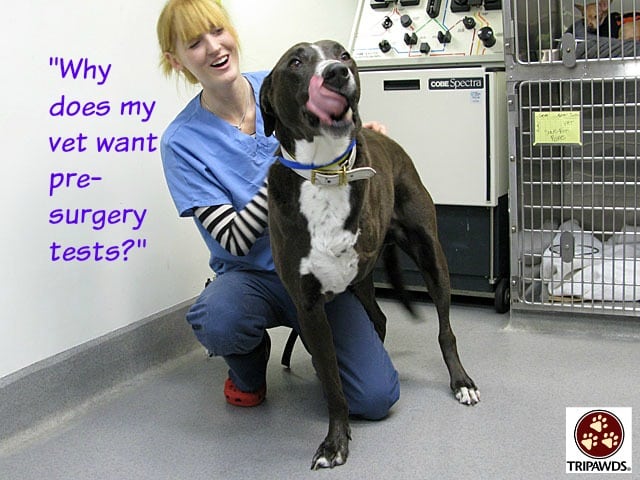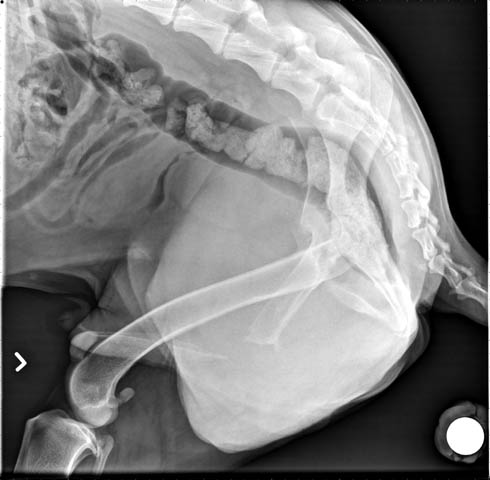Recently more than one new member has wondered why their vet wanted to run pre-amputation diagnostic tests.
“This third vet asked if there was an ‘abdominal ultrasound ‘ performed….I said ‘no’ and they are suggesting that before moving forward with amputation.” — victorsmom8
While it’s understandable that we all want to be cautious about the cost of what’s coming, you should know that vets don’t suggest tests in order to rack up our bill. Pre-amputation diagnostic tests (as well as any done before surgery of any kind) are critical for the health and even life of your dog or cat.

Yes, these pre-amputation diagnostic tests costs money, but they matter because they can:
- Identify any medical conditions that haven’t manifested in the past
- Reveal any medical conditions that aren’t visible with a physical exam
- Predict your dog or cat’s anesthetic risk.
Perhaps one of the greatest benefits of pre-surgical testing is that your vet can determine your dog or cat’s blood clotting ability. Not all pets, like Greyhounds, are very good at it.
“The purpose of pre-surgical coagulation testing is to detect clotting defects that can cause serious complications during and after surgery. By informing the client of this, they can be assured that excessive bleeding will be minimized during surgery. The medical team can also detect whether a patient has a congenital or cquired bleeding disorder that requires further care and diagnostic workup.” — The American Animal Hospital Association.
When cancer is suspected, pre-amputation tests can also reveal:
- If metastasis has occurred.
- The tumor type and precise location.
Recommended Pre-Amputation Tests
 All dogs and cats who might undergo amputation should have:
All dogs and cats who might undergo amputation should have:
- Pre-surgical blood tests including:
- a CBC
- chemistry and electrolyte profile
- coagulation testing
- x-rays (or a PET-CT scan) if osteosarcoma is suspected.
For certain types of suspected limb cancers known for metastasis to other organs, your vet might recommend an abdominal ultrasound. That’s not cheap but according to Dr. Sue Ettinger it’s an important pre-surgery step.
“Abdominal ultrasounds are not painful or invasive, and can be used to evaluate the dog’s overall state of health before embarking on extensive and expensive treatments.” — Dr. Sue Ettinger, The Dog Cancer Survival Guide
If your vet is not performing these tests before amputation — or any surgery — you may want to reconsider that practice. Many low-cost clinics help people save money by skipping them, but the results can be disastrous. According to Dr. Carolyn Karrh in her excellent blog post “The Difference Between Low Cost Spay/Neuters and Regular Clinics May Surprise You“…
1) Low-cost clinics do not typically require or offer bloodwork before surgery.
One main reason for this is because most young, healthy animals do not have any underlying metabolic issues. But there are always exceptions. If the clinic provides a bloodwork option, your cost will go up. But if you decline the bloodwork or if the clinic doesn’t offer it, if your pet has an underlying medical issue (liver or kidney disease, bleeding disorder, etc.), the vet and staff will not know and the risk for surgical and post-op complications will go up. Or your pet may die. Bloodwork helps your vet and staff know what risks are present, what anesthetic drugs to use and/or whether your pet can even safely have surgery.
What If You Can’t Afford the Pre-Amputation Diagnostic Tests?
all the pre-operation analysis plus amputation cost is simply unaffordable at this time. — chrisvd
All vets understand that paying for a major procedure like this is an emotional and stressful situation for us. Your vet is just as vested in the health of your dog or cat as your are and they understand that money plays a big role for most people. Here’s what you can do if you can’t afford all of the tests they’re suggesting.
- Ask which tests are critical and why.
- Have your vet rank the test in order of importance.
- Talk to your vet about your financial situation.
- Ask about payment options.
More Reading
More Cancer Questions Answered at #AAHA2016
Learn About Post-Amputation Bleeding Greyhounds
X-rays vs. CT Scans for Canine Bone Cancer Staging
Dr. Hady Demystifies MRIs and CT Scans
Dr. Sue’s Recommended Tests for Osteosarcoma Diagnosis and Work up (pre-surgical biopsy optional)